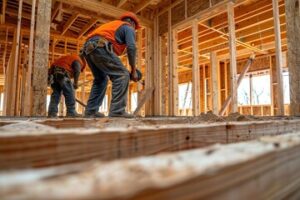Find a contractor with a history of working on similar projects to yours. Ask for references and drive by or visit the sites to understand their work.

Commercial contractors are licensed professionals with extensive knowledge of building codes, zoning regulations, and local laws for construction and remodeling. They also have a good relationship with material vendors and subcontractors for easy and quick project completion. Visit https://www.infinity-construct.com/ to learn more.
Commercial contractors are responsible for a wide variety of tasks on large construction projects. They take care of the project budget, hiring subcontractors and other personnel, and working within tight schedules. They have the experience to work on large projects and know how to handle special building code requirements, material regulations, and on-site safety protocols that are required for business construction.
A reputable and reliable commercial contractor will always provide their clients with a detailed quote for the cost of the entire project. They will also make sure that all materials are procured and delivered to the site in a timely manner. This will allow them to meet deadlines and avoid delays and other costly consequences. They will also keep the client updated with their progress and address any issues promptly.
When selecting a commercial contractor, it is important to consider their previous work and their reputation. Ask for a list of references and contact them to learn more about their experience and work quality. You should also pay attention to their pricing structure and compare it to the overall project costs. Remember that the lowest bid isn’t always the best option, as it may indicate that they are cutting corners.
A good commercial contractor will have a strong working relationship with their subcontractors and other team members. They will also have a vast network of suppliers that they can utilize to get the best possible materials, laborers, and equipment for your construction project. They will also be able to offer you discounted rates due to their long-term professional relationships with these vendors.
Throughout the construction process, commercial contractors will continuously monitor the costs of the project to ensure that it stays within budget. They will use a cost-tracking software or other tools to help them stay on top of expenses and prevent overspending. They will also be able to manage all the resources efficiently, which can lead to significant cost savings.
In addition to monitoring costs, commercial contractors will constantly communicate with the subcontractors and other team members about their progress. They will also ensure that all the necessary paperwork is in order and that the project is following all local, state, and federal laws.
They Manage the Subcontractors
Commercial contractors are able to manage the complex process of designing and constructing medium to large construction projects. They oversee the whole construction process from start to finish and are responsible for hiring subcontractors, ensuring that all the necessary permits are obtained, handling inspections, and ensuring that the project stays within its budget. They also handle the logistics of the project, including material procurement and scheduling. Because they are more experienced in managing such tasks, they are able to provide quality services that will meet the requirements and deadlines of the project.
Subcontractors are hired to perform unique or specialized tasks that the general contractor doesn’t have the necessary credentials for. They can include plumbers, electricians, framers, carpenters, or other individuals that specialize in different aspects of the project. Using subcontractors helps the general contractor to stay on schedule and avoid delays due to manpower shortages.
In order to find good subcontractors, it’s important to take the time to interview them and ask for references from previous clients. This will help you determine their experience and skill set. You should also check if they are licensed and insured, as this will help protect you from any liability issues that may arise on the job site.
It is also a good idea to record the performance of each subcontractor in some way. This can be done through internal ratings or by storing financial performance data. This will make it easier to select subcontractors for future tenders. Lastly, it’s a good idea to use multiple methods of finding subcontractors, such as contacting local property management groups for recommendations or searching online.
Once you’ve selected a few potential subcontractors, it’s important to put together a list of requirements that you will use to evaluate their bids. This can include a breakdown of the scope of work, a detailed project timeline, and an estimate of how long it will take to complete the job. This will help you to compare the subcontractors’ bids and choose the best one for your needs. Additionally, it’s a good idea to create a system for recording subcontractor performance so that you can easily access this information in the future.
They Manage the Budget
Effective budget management is an essential part of successful project execution. It helps reduce construction delays due to financial constraints. It also protects a business from cash flow problems by preserving the company’s reserve and allowing it to invest in growth opportunities.
Commercial contractors have extensive experience in developing accurate cost estimates. They use a variety of tools and techniques to ensure that the final cost estimate is in line with the project’s scope, specifications and budgetary requirements. In addition, they carefully monitor costs throughout the construction process and regularly compare actual expenditures against projected budget estimates.
They know that construction projects can incur a wide range of expenses including materials, labor, equipment and permits. They are adept at identifying ways to reduce these costs through the practice of value engineering. This is a process that seeks to optimize project costs without sacrificing quality or functionality. They are also skilled at estimating the impact of seasonal variations on project costs. For instance, they understand that constructing a large building during the peak of building season can significantly increase the overall cost of the project.
To keep project costs within control, commercial contractors develop detailed construction plans and budgets that take into account the specific project needs. They carefully select and negotiate with subcontractors to get the best prices for each aspect of the work. They also ensure that all necessary documents and permits are in place prior to the start of work. They also track and record every expense, using software or other cost-tracking tools to identify any deviations from the initial estimate.
A well-managed budget enables the construction team to meet or exceed the client’s expectations and minimize project delays. It also helps to avoid legal disputes, liens and financial penalties. Demonstrating that a commercial contractor is financially stable and reliable can also help in attracting potential customers, vendors and investors.
A good budget plan also allows for surplus income that can be used to pay for personal expenses or to invest in new projects. This is especially important for freelance contractors, who should always separate their business finances from their personal ones. This will prevent them from crossing the line between their business and personal expenses, which could lead to tax issues.
They Manage the Schedule
A construction schedule is a calendar of timelines that helps construction professionals plan the order and duration of building activities. Commercial contractors use it to manage the project, track progress, and inform the entire team on their responsibilities. It’s also important to review the schedule often. For example, if material delivery is delayed, it may impact activity and require changes to the overall schedule.
Contractors who have a well-defined construction schedule can improve their chances of getting the project on time and on budget. To create a project schedule, contractors first identify tasks and their completion dates. They then look for interdependent tasks and determine how long it will take to complete all the necessary work. This process is called critical path analysis. Critical path tasks are those that directly impact the overall project’s completion date. Delays in these tasks can cause the entire project to slip. Using critical path analysis, contractors can identify potential problems and take mitigating actions. For instance, they can pull resources from other tasks that are ahead of schedule to get the critical path tasks back on track.
Once the schedule is established, commercial contractors begin to execute it. For each task, they assign a responsible party and set the start and finish dates. They also identify and purchase materials that will be needed to complete the task. For large projects, they usually use a system known as a Schedule of Values (SOV) or a work item based approach. This allows them to bill their clients on a monthly basis in accordance with the amount of work completed.
Managing a commercial construction project requires an incredible amount of coordination and attention to detail. A good commercial general contractor will make sure that the work is done right, on time, and within the established budget. To help them do this, they will use their years of experience to negotiate good deals on supplies and labor. They will also know which materials are the best quality for a particular application and can avoid low-quality items that will cost more in the long run.
